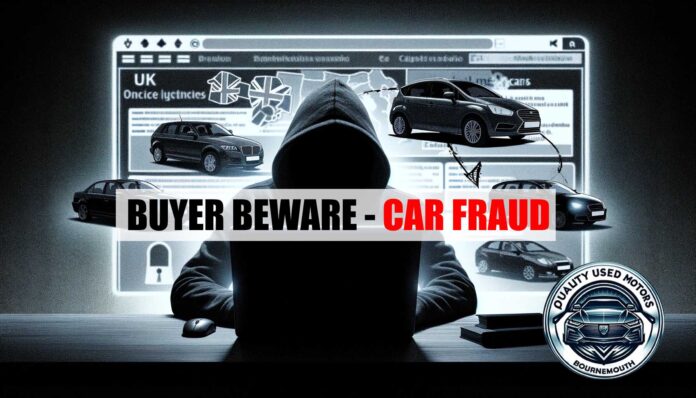The Pitfalls of Private Purchases
The digital landscape is reshaping the UK’s used car market, not always for the better, as a wave of fraud and deception sweeps across online and private sales. Close Brothers Motor Finance’s 2022 “The Road Ahead” research painted a grim picture, revealing that 10% of Brits have been ensnared by car-buying fraud. This unsettling trend is accelerating, with Lloyds Bank reporting a 74% surge in vehicle scams in the first half of 2023 compared to the previous year.
Fraudsters are becoming increasingly sophisticated, using stolen photos and videos to create convincing listings for cars they don’t own. Unsuspecting buyers, lured by these realistic adverts, find themselves out of pocket, with sellers vanishing once payment is made. This method of scamming has contributed to a significant financial loss, with research from Santander highlighting a 93% increase in funds lost to these schemes in 2023. In a startling revelation, Santander discovered that nearly half a million pounds (£479,964) were reported lost to Facebook car scams alone, marking a concerning rise in social media-facilitated fraud. Further investigation by Santander fraud investigators uncovered an alarming volume of deceit: within just 30 minutes, they identified 25 ‘sellers’ who had posted around 4,000 fake advertisements on Facebook Marketplace, illustrating the scale and audacity of modern scammers.
Navigating Troubled Waters
The allure of snagging a bargain and the promise of a straightforward deal have long drawn buyers to the private used car market. However, this route is fraught with pitfalls that can ensnare the unwary buyer. From the absence of consumer protections to the peril of purchasing stolen vehicles, the list of potential woes is extensive. Issues like unclear vehicle history, the risk of hidden faults, and the menace of odometer tampering only scratch the surface of what buyers might face.
A particular concern is the phenomenon of ‘resteal’ scams, as outlined by Claims Management & Adjusting (CMA). Here, buyers are duped into purchasing cloned vehicles, only to have them stolen days later by the sellers with a spare key. This cunning fraud highlights the sophisticated methods scammers employ to exploit private buyers.
The Internet: A Double-Edged Sword
The digital age has transformed the way we buy and sell used cars, but not without introducing new risks. According to the same ‘The Road Ahead’ study, 28% of people identify social media as the primary battleground for fraud, with private sales via the Internet coming in a close second. This trend underscores the growing concern over the safety and reliability of online transactions, where anonymity and distance play into the hands of fraudsters.
Conversely, car dealerships are perceived as safer havens, with only 8% of respondents viewing them as hotspots for fraudulent activity. This perception is likely grounded in the regulatory framework and consumer protections that envelop transactions with registered businesses.
Vigilance Is Key
The current landscape of the used car market in the UK serves as a stark reminder of the vigilance required when venturing into private sales. Buyers are urged to exercise due diligence, from verifying the vehicle’s history and ensuring a thorough inspection to demanding proper documentation and resisting pressure sales tactics.
While the appeal of finding a bargain privately remains undiminished, the potential costs—financial, legal, and emotional—of falling prey to fraud can be devastating. The rise of sophisticated scams like ‘resteal’ only adds to the imperative for buyers to approach private car sales with caution and scepticism.
The Top 15 Hidden Hazards of Private Car Purchases
Opting to buy a used car from a private seller might seem appealing initially, with the prospects of lower prices and direct negotiations tempting many. This path, however, skirts the safeguards typically provided by registered dealerships, leading buyers into a minefield of potential issues. From cars sold “as seen” without any fallback for the buyer, to the perils of obscured histories, and the gamble of inheriting vehicles with hidden debts or tampered mileage, the list of hazards is extensive. Each of these risks, detailed below, underscores the critical need for vigilance and due diligence in private car transactions, urging buyers to proceed with caution and arm themselves with as much information as possible before making a purchase.
Buying a used car privately from an unregistered seller can offer some attractive benefits, such as potentially lower prices and a direct negotiation process. However, this approach comes with several significant risks and drawbacks that buyers should be aware of. Here’s a comprehensive list of 15 of the most negative aspects/consequences/risks associated with such transactions:
1. Lack of Consumer Protections: Unlike purchasing from a registered dealer, private sales often come with “sold as seen” conditions, leaving the buyer with little to no recourse if issues arise post-purchase.
2. Unclear Vehicle History: Unregistered sellers may not provide a complete or accurate history of the vehicle, including past accidents, service records, or maintenance issues, which can obscure potential problems.
3. Risk of Stolen Vehicles: There’s a higher risk of buying a stolen vehicle, as unregistered sellers may not have the proper documentation or may provide falsified documents.
4. Outstanding Finance: The car might have outstanding finance on it, which can lead to legal complications and the potential for the vehicle to be repossessed by the finance company.
5. Odometer Tampering: There’s a risk of odometer fraud, where the mileage is rolled back to increase the vehicle’s selling price.
6. Hidden Faults: Without a warranty or guarantee, any faults or issues that emerge after the purchase become the buyer’s responsibility, potentially leading to significant additional costs.
7. No Pre-sale Inspection: Private sellers are less likely to provide access to comprehensive pre-sale inspections by independent mechanics, which can result in the buyer overlooking critical mechanical issues.
8. Unsafe Vehicles: There’s a higher chance of purchasing a car that’s unsafe or not roadworthy, which can pose serious safety risks.
9. Legal and Paperwork Issues: Buyers may face challenges with incorrect or incomplete paperwork, leading to difficulties in transferring ownership or proving the legality of the sale.
10. Inaccurate Descriptions: Vehicles may not be as described in advertisements, and without the protections offered by trading standards, buyers have limited options for recourse.
11. Payment Risks: There’s a risk of fraud in the payment process, with buyers potentially being scammed out of their money without receiving the vehicle.
12. No After-sales Support: Unlike dealerships, private sellers offer no after-sales support or advice, leaving buyers on their own if questions or issues arise later.
13. Insurance and Warranty: Vehicles purchased privately may not come with the option of an extended warranty, and arranging immediate insurance coverage can be more cumbersome, potentially delaying the use of the vehicle.
14. Pressure Sales Techniques: Private sellers, eager to dispose of their vehicle, may employ pressure sales techniques that can lead to rushed decisions without proper due diligence.
15. Time and Effort: The process of finding a reliable vehicle through private sales can be time-consuming and fraught with the risk of encountering dishonest sellers or unsuitable vehicles.
Being aware of these risks is crucial for used car buyers considering a private purchase. Conducting thorough research, getting the vehicle independently inspected, and taking steps to verify the seller and vehicle history can help mitigate some of these risks.
Safeguarding Your Journey: The Path to Trusted Vehicle Ownership
In the shadow of the concerns outlined, the importance of purchasing from reputable sources has never been more pronounced. Amidst a marketplace brimming with uncertainty, Quality Used Motors in Bournemouth stands as a beacon of reliability and trust. Offering a contrast to the precarious nature of private sales, Quality Used Motors provides buyers with the peace of mind that only comes from dealing with a trusted, reputable dealer.
With an unwavering commitment to quality and customer satisfaction, Quality Used Motors ensures that every vehicle in its inventory undergoes rigorous checks and inspections, guaranteeing a history of transparency and safety. From comprehensive consumer protections to after-sales support, the benefits of choosing a reputable dealer like Quality Used Motors are clear. Buyers are not only shielded from the myriad risks associated with private transactions but are also welcomed into a buying experience that prioritises their needs and safety.
As the landscape of used car sales continues to evolve, the choice to partner with a dealer known for its integrity and excellence becomes all the more critical. Quality Used Motors exemplifies the standards to which all dealers should aspire, offering a straightforward, secure path to car ownership. In a market fraught with hazards, their dedication to upholding the highest standards of service and reliability offers a safe harbour for car buyers navigating the tumultuous waters of used car purchases.
While the allure of potentially lower prices and direct negotiations might draw buyers towards private sales, the risks outlined underscore the value of purchasing from a reputable used car dealer. Quality Used Motors in Bournemouth represents the gold standard in used car sales, providing a safe, transparent, and dependable service that stands in stark contrast to the uncertainties of the private market. For those looking to invest in a used car, turning to a trusted name like Quality Used Motors is not just a choice—it’s a safeguard for your peace of mind and a guarantee of a smooth, serene drive into the future.








